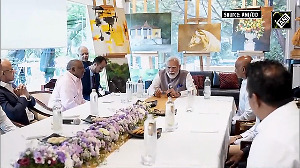Though the discovery of Israeli military hardware at a shipping agent's residence in New Delhi raises questions of security, military officers insist that India has a complex, stringent, working system of permits in place for such imports and there is no need to review the mechanisms for bringing sensitive or dangerous military goods into the country for trial.
On September 25, the Delhi police had found 13 boxes of electronic guidance systems and three missile casings at the home of Dhirendra Vyas, consignee agent for Israel Aircraft Industries.
The goods, sent for Indian Air Force trials at Jaisalmer, were withdrawn by the company from the tests after they arrived in New Delhi on a chartered aircraft.
An IAF spokesman explained, "As is customary, certain equipment was offered by the vendor [for] trial. Equipment arrived on September 16. The vendor decided to withdraw from the trial. Instead of returning the equipment in safe custody, it was moved to a residential area where it was checked by the police and confiscated."
The vendor then approached the IAF to intervene and help him retrieve the confiscated goods.
An IAF officer explained that depending on the size and nature of equipment, it is either sent to the vendor, who gets customs clearance and puts it up for trial himself, or handed to the IAF logistics department if it requires specialised handling. Specialised handling is required for explosives, sensitive technology, or large pieces of equipment.
The officer said there is a "very complex" licensing system in place for bringing military goods into India for trial and taking them back. If one of the services wants to test a particular equipment, the companies manufacturing it have to be short-listed in accordance with the general staff qualitative requirements. These companies are then asked to bring in their hardware with the necessary licences.
Foreign defence companies "bring in lethal and non-lethal equipment for trials in India on a 'no-cost, no-commitment' clearance issued by the Ministry of Defence and with valid licences from the Directorate General of Foreign Trade," Commodore Ranjit Rai (retired) explained.
Rai, who has held posts in Naval Headquarters dealing with defence trials and purchases and is now a leading commentator on defence acquisitions, said that since military equipment is on the negative list and not the open general licence list, special permission from the DGFT is necessary.
Once the necessary licences are procured, the goods are brought in by air or ship. If they land at a port, a tri-service agency called the embarkation headquarters clears them and hands them over to the military personnel concerned or the authorised representatives of the company, depending on the nature of the cargo.
At the airport the equipment could either come on regular flights or on private/chartered planes. In this case, the guidance systems arrived by special aircraft. Customs cleared them, after which the company's representative in New Delhi took charge of the equipment with the assistance of IAF officers.
Lieutenant General V K Sood (retired), a former vice-chief of army staff, said someone somewhere must have made a mistake if the Israeli company was allowed to withdraw the equipment from trials and store it at a residence. "In case the equipment is of a sensitive nature, security and storage within India is the responsibility of the service concerned," he pointed out.
But the IAF officer quoted earlier insisted that the Directorate of Air Staff Requirement has proper records of the goods in India for trial. "The only mistake, if there is a mistake here at all, was that the company representatives did not hand the items to the IAF for safekeeping before sending them back," he argued.






 © 2025
© 2025